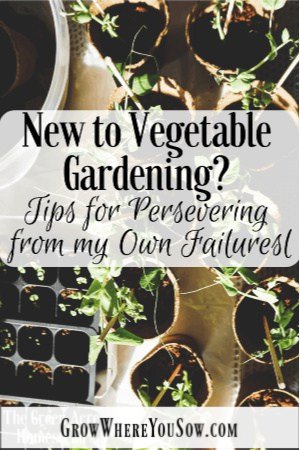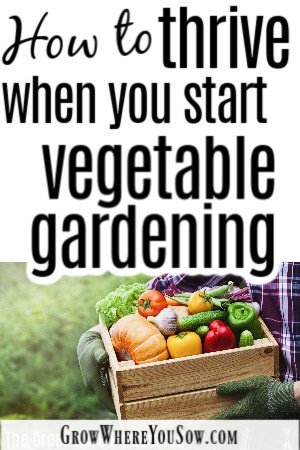New to vegetable gardening?
If you’re new to vegetable gardening there are a few things you probably need to know. First thing, it can be difficult. If someone tells you that gardening is easy-breezy then they’re lying or just naturally have the talent, like my husband…not like me. I’ve had to work at knowing how to garden.

Table of contents
Tips from a fellow gardener and how I overcame my failures.
Here are a few things to know when you start to garden or you’re just having trouble (like me lately!) If you’re a complete beginner, a great place to start might be my post “How to Plant a Vegetable Garden for Beginners“!
Soil testing is important for vegetable gardening
When you’re new to gardening and want to succeed and understand why you’re succeeding, or not succeeding, it’s required. I gardened my first two years on the homestead without having a soil test.
Our first year was great and my husband was more involved. The second-year planting the new vegetable garden was mostly me and it wasn’t as good. I was frustrated and confused by my third year, as you can imagine. I grew some beautiful carrots, cabbage, and garlic.
But I struggled with some of the usual crops like beans, which is one of the easiest vegetables to grow! Finally, I thought “that’s it, I HAVE to get a soil test”. I finished my third year relatively pleased and I’m going into my fourth year of gardening feeling pretty good.
Don’t just get your soil tested but also have someone explain what it all means to you. Then decide what you need to do! If your soil is sand-like ours, you’ll probably buy dirt and practice raised bed vegetable gardening.
You could mend your sandy soil but it might take longer than you want to wait. Maybe your ground soil is decent but it just needs certain elements. Getting your soil tested will let you know what/how much to add in order to mend your soil and direct sow in the ground.
Companion vegetable gardening
After last season, I’m kind of ashamed of myself for not taking companion gardening a little more seriously when I was new to vegetable gardening. I’ve read so much about it and, if I’m being honest (which I am because that’s what we do here), I ignored all of it because I liked to have full gardens of one thing.
Tidy rows of the same crop look good, but it isn’t always the best option. Now, some people will tell you companion gardening isn’t a sure thing that works. I don’t believe that AT ALL.
I grew the best carrots I’ve ever grown last season and I’m 99% I was able to do it because of balanced soil and companion gardening: planting the carrots with garlic!
When I started planning my vegetable garden for this new season I made sure to Google search “What to plant with *insert vegetable here*” before placing it in my garden planner.
This season I am practicing heavy companion planting with every one of my crops. I don’t have perfectly sectioned/categorized rows and that’s okay. I’m so excited to see how this season goes!
Crop rotation
Okay, so crop rotation is something that I’m not sure is a sure-fire thing to do or don’t yet. Some crops should always be rotated and some crops don’t have to be rotated; that’s my understanding of crop rotation. It really depends on what was planted there and how to treated the soil during the previous season.
I found this article really helpful and informative when reading about crop rotation in a new vegetable garden and would like to direct you to it! It makes perfect sense to me after reading that article and I do try my hardest to practice crop rotation because I have the space to do so.
I’ve found Youtube videos of gardeners who NEVER rotate their crops, and they don’t have a problem. Maybe this is because they add so much new soil every season that it doesn’t matter, I’m not sure. Once I find out, I’ll let you know!
Until then, read about crop rotation and decide what the best decision is for you and your area and method. When you’re new to vegetable gardening, you just can’t read enough!
Composting, mending soil, etc.
Alright, after talking about vegetable crop rotation I’d like to talk about composting, mending your old soil to be new, etc. Different crops deplete your soil of different nutrients.
Legumes add nitrogen to the soil and brassicas suck it right up. There are so many ways to mend your soil, and I’m just learning this. You can use manure from vegetarian animals. Most gardeners practice backyard composting and add their compost to their gardens every season.
You can also buy compost or black cow from your local garden stores or buy compost from larger bulk sources in some areas. I use bone meal as a source of nitrogen when my chicken manure isn’t ready.
We also have rabbits and I’m learning to use their manure in my gardens, as well. My local feed store introduced me to a product called SUPERThrive fertilizer which is a highly-concentrated non-toxic vitamin solution.
Our nursery told us to diluter the SUPERThrive [aff link] and water our pomegranate tree once a week and within a month the tree had new growth. Before SUPERThrive, the tree had just stopped growing. It wasn’t dead, but it wasn’t growing either. Since using SUPERThrive our pomegranate trees have grown inches. Now, whenever I see my fruit trees struggling I use it. You can buy it SUPERthrive here if you’d like to try it!
I’ve been using it every couple months on our fruit trees and they’re taking off! I plan to water my vegetable gardens with it once a week to start. I’m SO excited to see what happens.
Sun
Hi, my name is Chelsea and I still consider myself new to vegetable gardening even though I’ve been gardening for years now. Also, I’m just now learning how much water my plants actually need and that the recommended sun hours on your seed packers aren’t always right.
I wrote a post a while back about using hoop gardens (read it HERE) and why we decided to use them. Since we live in Florida and placed our garden beds where there is zero shade, our soil and plants get scorched!
After one rather hot summer, I added hoops to our gardens in order to add shade. The shade cloth I chose blocks 30% and the hoops are removable. If I see that a crop is getting too much sun, I pull the shade cloth down and vice versa.
Water
We all know that watering your new vegetable gardens is a good idea. What you might not know is that you can water TOO much! For example, we had an extremely wet Summer in Florida this last year and I had to pull up my zucchini and summer squash because they started to mildew from all the rain!
My best advice on watering your gardens is to read, water, and evaluate. If your soil is clay-like you won’t need to water as much because clay retains water far better than something more sandy. Another thing to think about is if you mulch your gardens, you won’t have to water as often.
How to know when to water
A trick to know when you need to water your vegetable garden is to stick your finger straight down into the soil. If the soil is moist, you don’t need to water and if it’s dry, water away! Watch your plants to see if they look over-quenched or just thirsty for more.
During the hottest part of the day, your plants will look droopy and thirsty but they are not! Your plants are just wilted and hot but will perk back up once the weather cools off. This is why our plants are erect in the mornings but wilted looking in the mid-afternoon. Plants with shallow roots will need more water, larger plants will need more water.
The hotter the day is planning to be, the more water your plants will need. You could also get a rain gauge! They’re cheap AND handy!
When is the best time to water?
Last, the best time to water your plants is in the morning before the day heats up. You never want to water your vegetable gardens during the hottest part of the day.
For starters, you’re wasting water because it will just immediately evaporate. Evenings aren’t the perfect time because your plants won’t have the opportunity to dry, therefore providing breeding grounds for disease.
This article by Morning Chores called “Watering Your Plants: How Often, When to Do It, and 10 Things to Know” has a lot of great information. It also mentions the finger in the soil trick!
KEEP VEGETABLE GARDENING!
If you’re brand new to gardening then I’ve probably scared you and I’m so sorry! Yes, gardening can be challenging at times. Beginning gardeners and experts alike are going to always run into roadblocks, that’s life.
Gardening is fun, rewarding, and teaches you so much about our Earth and food. I can’t tell you how excited I was harvesting cabbage and garlic fo the first time this Fall season! My next goal is to learn to successfully grow broccoli!
Are you new to gardening? What have you had problems with? How to your persevere? I’d love to hear about it in the comments below!

